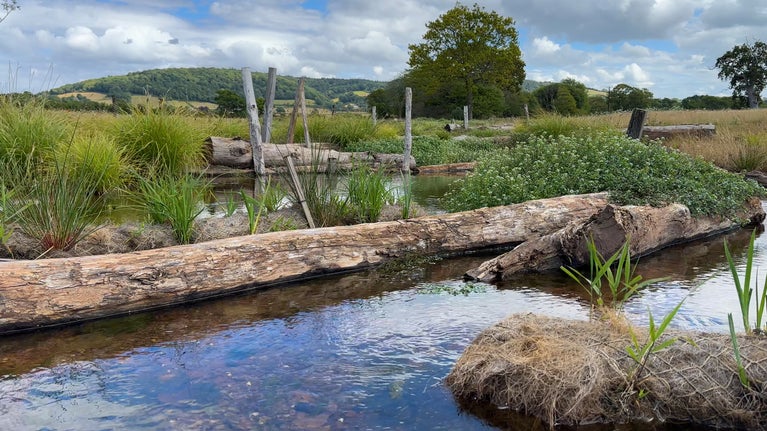National Trust river project at Holnicote in Somerset, wins prestigious UK River Prize 2025
- Published:
- 01 April 2025
- Last updated:
- 01 April 2025

An ambitious project aimed at restoring natural processes and ecological function in Somerset’s River Aller and Horner Water catchments has triumphed at the prestigious 2025 UK River Prize awarded by the River Restoration Centre (RRC), winning the Catchment Restoration Award.
The Holnicote Estate Project, one of three finalists, led by the National Trust, is supported by the Environment Agency with significant funding from Interreg 2 Seas Co-Adapt programme, Defra’s Green Recovery & Species Survival Funds and others.
Runners up were the Eddleston Water Project, led by Tweed Forum, and the Howgill Beck Naturalisation Project, led by the RSPB.
For centuries, the rivers in this area of Somerset have been simplified and straightened disconnecting them from the landscapes surrounding them, providing little resilience against flooding or in times of drought.
Since 2018, the Riverlands team at the National Trust’s 12,500-acre Holnicote estate have been delivering pioneering and innovative approaches to both river restoration and land management, by taking a catchment-based, landscape scale approach. This has resulted in the area being both resilient in times of flood and drought, while also being rich in nature, while remaining agriculturally productive.
Key areas of work have included the reintroduction of beavers into two enclosed sites and the UK’s first large-scale main river restoration using the “Stage Zero” technique.
This method, the ‘ctrl-alt-delete’ of a river reset, has transformed an historically straightened 1.2km section of the River Aller, allowing the river to find its own course, resetting it to a more natural state with multiple, cross-connected channels flowing freely, slowly and fully connected to the floodplain. The result has been the creation of seven hectares of waterscapes and wetlands (equivalent to more than ten football pitches[2]).
Dead wood, once a common natural feature in our rivers’, was also used to help create the new wetlands by helping to slow and spreading the flow of water. The land now remains wetter for longer periods of time, boosting biodiversity and water storage capacity, helping the river become more resilient to extremes of weather.
Ben Eardley, Project Manager for the National Trust on the project said: “We’re absolutely delighted to receive this national recognition for our work in restoring the health and resilience of the Horner and Aller catchments.
“Early results have been very promising—flood peak reductions of up to 40%, longer lag times, and decreased turbidity are just a few of the indicators showing the project’s impact.
“This prize wouldn’t have been possible without the strong collaboration of our partners, the dedication of local farmers, and the ongoing support from the community.”
Stewart Clarke, National Freshwater Specialist at the National Trust said: “Drawing inspiration from successful projects in Oregon, the National Trust has been at the forefront of experimenting with the ‘Stage Zero’ technique at Holnicote.
“This innovative approach is not just a groundbreaking step for river restoration in Europe, but also an exciting opportunity to learn more about how we can harness the natural processes that our rivers once relied on.
“Stage Zero offers huge promise for river systems rich in nature that can store water, sediment and carbon and we can create such wetland reaches within the network of more familiar single channel rivers where space allows.”
Matt Pang, Strategic Planning & Partnerships Team lead at the Environment Agency commented: “Winning the RRC UK River Prize is a huge achievement for everyone involved and reflects the tireless work and dedication of the team. We’ve been privileged to collaborate with the National Trust over the past six years, and this recognition is a testament to their leadership and innovative approach. I look forward to continuing our partnership as we further restore the health of these vital river catchments.”
Similar work has also been undertaken across 125 hectares of Tivington Farm upstream of the River Aller Stage Zero scheme. Several kilometres of ditches were restored, and the farm was also reverted back to pasture from recent arable practice to reduce the impact of land management on the water environment.
The team at Holnicote will also now continue its restoration efforts, ensuring a more climate-resilient and biodiverse landscape.
Plans include the development and delivery of a Landscape Recovery Scheme to offer fair compensation for land managers who prioritise habitat and wildlife conservation.
To find out more about the Riverlands project: https://www.nationaltrust.org.uk/appeal/porlock-vale-riverlands-appeal